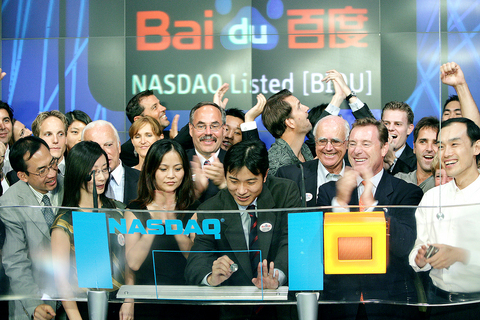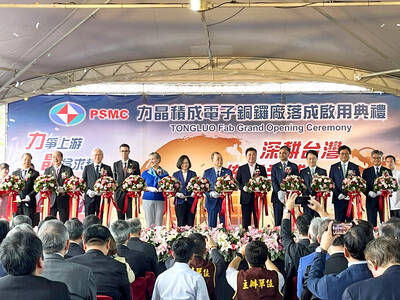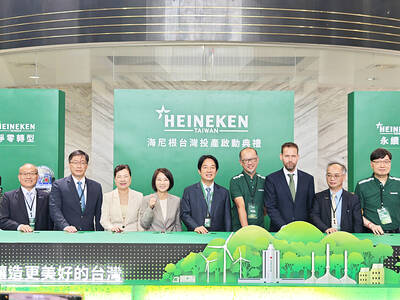Baidu.com Inc (
The Beijing-based company's shares closed at US$122.54 on the NASDAQ Stock Market, a 354 percent gain from its initial public offering (IPO) price of US$27. That represented the biggest one-day gain since the final days of the dot-com when IPOs regularly soared.
No IPO has climbed as high on the first day of trading as Baidu's did on Friday since the shares of software maker Selectica Inc soared 371 percent during their March 2000 debut, according to IPOhome.com. Selectica's shares closed unchanged on Friday at US$3.15 on the NASDAQ.

PHOTO: AP
The rapid run-up gave Baidu a market value of US$4 billion -- a lofty appraisal of a five-and-a-half-year-old company that only recently became profitable. Baidu earned US$1.8 million on revenue of US$13.6 million during the first half of this year.
The company's management expects much bigger things as more of China's vast population surf the Internet. More than 100 million of China's residents currently surf the Web. Baidu has been able to pluck enough visitors from that audience to emerge as the world's sixth-most trafficked Web site.
"I am very confident in the future of Internet search in China," Baidu chairman Robin Li (
Googlemania played a major role in Friday's buying frenzy.
As the early search-engine leader in China's nascent Internet market, Baidu is inspiring comparisons to Google Inc.
Like Google, Baidu -- traded under the ticker symbol BIDU -- so far has made most of its money from text-based ads that are tied to search requests and generate a commission whenever the commercial links are clicked on.
Drawn by Baidu's potential, Google even paid US$5 million last year for 749,625 of the company's shares -- a stake worth US$92 million on Friday.
Google's early ownership interest has convinced some investors that it will eventually buy Baidu for a lucrative price, although there has been nothing concrete to support that belief.
Memories of Google's IPO may have provided Baidu with its biggest lift. Nearly a year ago, Google went public at US$85 per share -- a price that many investors viewed as inflated but now looks like a bargain with the company's shares closing at US$292.35 on Friday.
"This is a `son-of-Google' investor mentality," said David Menlow, president of IPO Financial, an industry newsletter. "Everyone remembers they could have had Google at US$85 and don't want to let it happen again."
Although Baidu's profits have been puny so far, Menlow and another IPO expert, Linda Killian, said the rapid run-up in the company's stock isn't quite the same as the late 1990s mania that produced mind-boggling valuations for unproven dot-coms that imploded into dot-bombs.
As the Internet becomes more ingrained in the everyday lives of the Chinese, it's possible to envision Baidu duplicating the tremendous growth that Google has enjoyed, Killian said. Google's market value now hovers around US$85 billion -- something that would have seemed unfathomable when Stanford University graduate students Larry Page and Sergey Brin launched the company seven years ago.
"There are a handful of companies where you need to dream," said Killian, a portfolio manager for an investment fund specializing in IPOs.
"You have to think, `If everything were to go right for this company, what could they achieve?' There are companies that could become the next Microsoft or Google," she said.
Li, who worked in Silicon Valley for a couple of years and received his master's degree in computer science from University of New York at Buffalo, formed the company with Eric Xu (徐勇). Although Xu no longer works at Baidu, he was alongside Li on Friday to watch the company's stock soar in its Wall Street debut.
Li, 36, ended the day with a personal stake worth US$920 million, but he said he won't let the sudden wealth affect him. He can't sell any of his stock for two years under restrictions imposed as part of the IPO.
"My passion is search and changing the lives of ordinary people with search," he said.
Baidu has awarded stock options to its 700 employees in China, giving them a slice of the wealth created by the IPO. Most of the workers can start holdings in six months.

purpose: Tesla’s CEO sought to meet senior Chinese officials to discuss the rollout of its ‘full self-driving’ software in China and approval to transfer data they had collected Tesla Inc CEO Elon Musk arrived in Beijing yesterday on an unannounced visit, where he is expected to meet senior officials to discuss the rollout of "full self-driving" (FSD) software and permission to transfer data overseas, according to a person with knowledge of the matter. Chinese state media reported that he met Premier Li Qiang (李強) in Beijing, during which Li told Musk that Tesla's development in China could be regarded as a successful example of US-China economic and trade cooperation. Musk confirmed his meeting with the premier yesterday with a post on social media platform X. "Honored to meet with Premier Li

ARTIFICIAL INTELLIGENCE: The chipmaker last month raised its capital spending by 28 percent for this year to NT$32 billion from a previous estimate of NT$25 billion Contract chipmaker Powerchip Semiconductor Manufacturing Corp (力積電子) yesterday launched a new 12-inch fab, tapping into advanced chip-on-wafer-on-substrate (CoWoS) packaging technology to support rising demand for artificial intelligence (AI) devices. Powerchip is to offer interposers, one of three parts in CoWoS packaging technology, with shipments scheduled for the second half of this year, Powerchip chairman Frank Huang (黃崇仁) told reporters on the sidelines of a fab inauguration ceremony in the Tongluo Science Park (銅鑼科學園區) in Miaoli County yesterday. “We are working with customers to supply CoWoS-related business, utilizing part of this new fab’s capacity,” Huang said, adding that Powerchip intended to bridge

Dutch brewing company Heineken NV on Friday announced an investment of NT$13.5 billion (US$414.62 million) over the next five years in Taiwan. The first multinational brewing company to operate in Taiwan, Heineken made the statement at a ceremony held at its brewery in Pingtung County. It also outlined its efforts to make the brewery “net zero” by 2030. Heineken has been in the Taiwanese market for 20 years, Heineken Taiwan managing director Jeff Wu (吳建甫) said. With strong support from local consumers, the Dutch brewery decided to transition from sales to manufacturing in the country, Wu said. Heineken assumed majority ownership and management rights

Microsoft Corp yesterday said that it would create Thailand’s first data center region to boost cloud and artificial intelligence (AI) infrastructure, promising AI training to more than 100,000 people to develop tech. Bangkok is a key economic player in Southeast Asia, but it has lagged behind Indonesia and Singapore when it comes to the tech industry. Thailand has an “incredible opportunity to build a digital-first, AI-powered future,” Microsoft chairman and chief executive officer Satya Nadella said at an event in Bangkok. Data center regions are physical locations that store computing infrastructure, allowing secure and reliable access to cloud platforms. The global embrace of AI